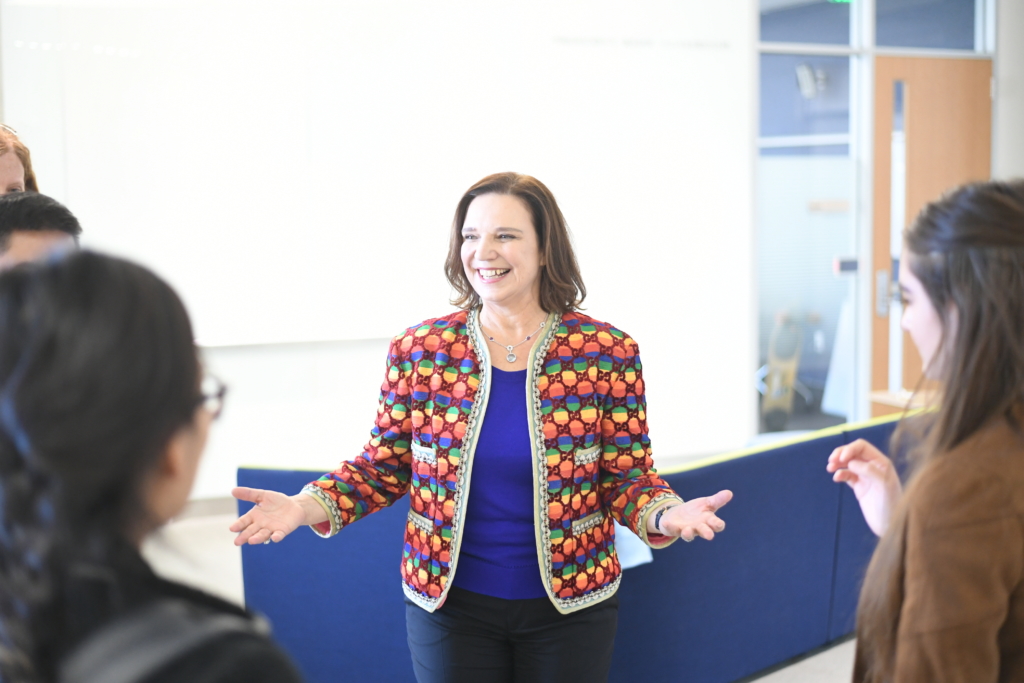
Haas Dean Ann Harrison. Noah Berger photo
The University of California system is the largest in the United States. Its crown jewel, UC-Berkeley, is arguably the best — and hardest to get into — public university in the world.
So when the Haas School of Business at UC-Berkeley announced this month that it will cease to be among the very few B-schools that only accepts juniors and seniors, it was a very big deal. Thanks to a massive $30 million gift from a pair of alumni, for the first time in more than 50 years, Haas in August 2024 will become a four-year program that accepts freshmen and sophomores.
“Berkeley has always been a really good, highly ranked program,” says Ann Harrison, dean of the Haas School, in an exclusive interview with Poets&Quants. “But I think this will take us to the very top. Moving from a two-year experience to a four-year experience is just going to allow us to create that much richer, deeper, longer experience that the students in the other top undergraduate business programs in the United States do have access to.”
‘REMARKABLE NEW OPPORTUNITIES FOR STUDENTS’
The Haas School announced the seismic shift to four years from two on July 19. It was made possible by several deep-pocketed alumni and other donors who have given more than $45 million, the bulk of which came in a huge chunk from Haas alumnus Warren “Ned” Spieker, who earned his business bachelor’s degree from Berkeley in 1966, and his wife, Carol, who earned a political science degree from the university the same year.
“A four-year undergraduate business experience will provide remarkable new opportunities for students,” says Ned Spieker, founder and former chairman and CEO of Spieker Properties, one of the largest owner-operators of commercial property in the U.S. “My hope is that this gift will help build a program that’s second-to-none in the world, cementing Haas as the top undergraduate business school for generations to come.”
UC-Berkeley will name the Haas four-year undergraduate business program the Spieker Undergraduate Business Program, enrolling the first four-year cohort of students in August 2024.
HAAS UNDERGRAD PROGRAM ENROLLED MORE THAN 50% WOMEN IN 2021
Haas, established in 1898, is the second-oldest business school in the United States. Beginning in the 1960s — shortly after Ned and Carol Spieker’s graduation — students applied to the Haas undergraduate program as sophomores and enrolled as juniors. By the last decade, the volume of annual applications had risen to around 750 from current Berkeley students and another 2,500 from transfer students, with the school making fall admission offers to around 250 from UC-Berkeley and roughly 100 from elsewhere. The fall 2021 entering class size was 345 total students, with 12% minorities among the Berkeley cohort and 22% among transfers; both cohorts were 53% women.
Haas’ undergraduate program was ranked third in 2021 by U.S. News & World Report. The B-school does not participate in Poets&Quants‘ annual ranking. In 2020 the school launched a deferred admission program for undergraduates to apply to its MBA program, which is the highest-ranked public-school graduate program according to both U.S. News and P&Q.
What will the switch to a four-year undergraduate program mean for one of the premier business schools in the United States? P&Q caught up with Dean Harrison on vacation in Italy just after the announcement of the historic expansion. For one thing, she says, it will mean a lot less stress for students.
“It will make a huge difference to the atmosphere of the program,” Harrison says. “Because right now what happens is, first they have to work so hard just to get into Berkeley. And then once you’re in Berkeley, if you’re interested in business, you spend the first two years doing all the pre-reqs not knowing whether or not you’ll get into the program. And it creates a lot of stress and a lot of anxiety, whether or not you’ll get in as a junior.
“This will allow students who apply as seniors in high school to know whether they are going to attend Haas.”
See the next page for highlights from the interview, edited for length and clarity.











Questions about this article? Email us or leave a comment below.